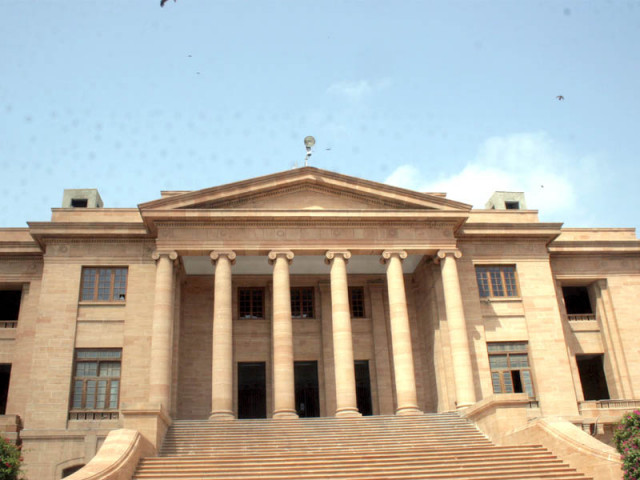SHC issues notices to ECP on PPP lawmakers’ plea
Orders deputy attorney-general to submit comments on behalf of the authorities

Sindh High Court. PHOTO: EXPRESS
A two-judge bench of the SHC, headed by Justice Munib Akhtar, on Tuesday directed the deputy attorney-general and provincial advocate-general to submit comments on behalf of the authorities concerned by a date to be later notified by the office.
The petitions were filed by PPP MNA from NA-210 Jaccobabad Ehsan-ur-Rehman, PPP MPA from PS-81 Abdul Rauf Khoso and Kashmore’s former nazim Saleem Jan Mazari.
SHC issues notices to former education secretary for lodging false cases
Naming the ECP, the provincial election commissioner and others as respondents, the petitioners approached the court challenging the amendment to the Elections Act, 2017.
They argued that before promulgation of the act, which was passed by the National Assembly in November 2017, carving of the NA constituencies as separate electoral units was carried out under Sections 8 and 9 of the Delimitation of Constituencies Act, 1974.
Similarly, the NA seats for districts Jacobabad and Kashmore were constituted as per Sections 8 and 9 of the repealed act and were carved and drawn as NA-208 Jacobabad-I, NA-209 Jacobabad-II and NA-210 Jacobabad-III as published in official Gazette dated March 26, 2002.
Redrawn boundaries: Court calls for comments from ECP on MQM plea
The petitioners said the arrangement of constituencies remained the same in the subsequent elections.
However, following promulgation of Elections Act, 2017, the provision of the Rule 8 Sub-Rule (2) of the Election Rules, 2017 introduced a new mechanism allowing the variation of up to 49% of the population whereas the Section 20(3) of the Elections Act, 2017 only allows variation up to 10% plus-minus.
Thus the Impugned Proviso is inconsistent, contradictory, beyond the scope and mandate of the parent statute i.e. the Elections Act, 2017, they said.
The petitioners argued that the ECP had radically disturbed the concept of uniformity of population by creating such irrational disparity through the proviso and had made it difficult to conduct elections in honest, just and fair manner in accordance with the law.
Rising street crimes: SHC issues notices to cellular companies
“If any election is conducted on the basis of provision causing malapportionment, debasement and disparity, [it] would be a serious violation of Articles 9, 17, 25 and 218 (3) of the Constitution and would be against the spirit of democracy and contrary to the provisions of Elections Act, 2017,” according to the petitioners.
Their lawyer, Rafiq Ahmed Kalwar, further argued that the respondents’ act of restricting the population within the administrative boundaries of a district on the basis of the proviso and restraint from overlapping even where the population is in excess from average is mala fide and devoid of merits.
He said the allocation of seats or quota for Kashmore and Jacobabad and the act of reduction of seats from 3 to 2 for the districts on the basis of new legal provision on flawed and erroneous ground of restraint from overlapping would be in severe violation to Section 20(3) & (4) of the Elections Act, 2017, which provided for the formation of constituencies within the variation of 10% plus-minus.
“However, now the reduction in seats for the said districts would amount to more than 40% variation in each district, which is groundless, unconscionable and would amount to malapportionment, debasement and disenfranchisement of the large population of the area and clearly falls within the ambit of ‘gerrymandering’, thus unconstitutional and illegal,” argued the petitioners.
They requested the court to declare the legal provision the Rule (8) Sub-rule (2) of the Elections Rules, 2017, as illegal and ultra vires the Constitution, being inconsistent with the parent statute i.e. the Elections Act, 2017 and the Constitution, hence void ab initio.
They further pleaded that the respondents be directed to carve the constituencies for the National Assembly in strict compliance with Sections 19 & 20 of the Elections Act, 2017 and fix the average population ratio in each constituency with legally permissible 10% plus-minus variation of population.



















COMMENTS
Comments are moderated and generally will be posted if they are on-topic and not abusive.
For more information, please see our Comments FAQ